How Compensation Impacts Employee Retention and Turnover
How does compensation affect employee retention and turnover? Discover how and learn strategies for fair pay that keep your top talent motivated.
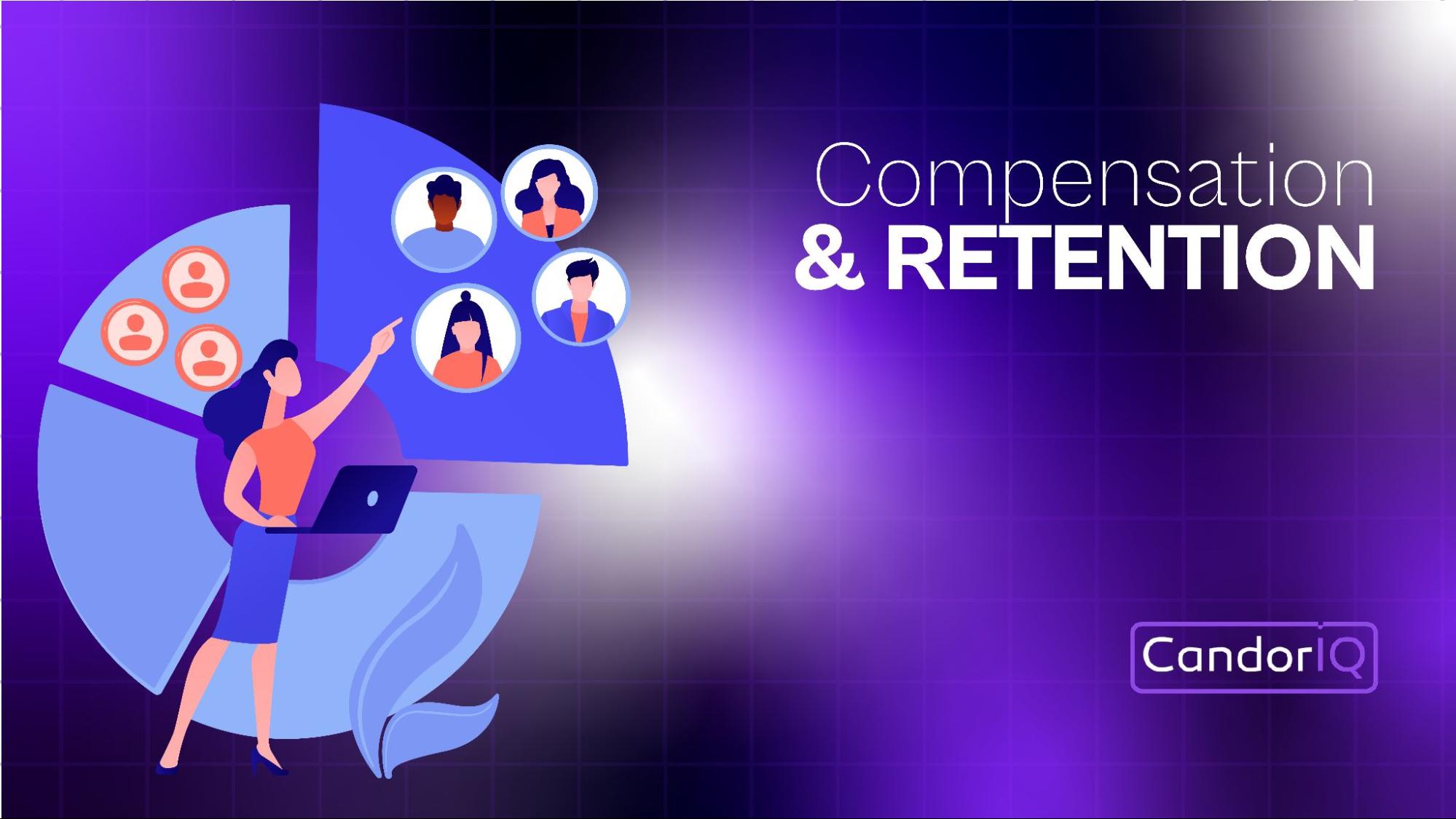
Employee retention is a top priority for organizations looking to build a strong, productive workforce, and compensation is a key factor that directly influences retention. Studies show that 82% of employees rate fair pay as “very important” or “extremely important” for them to be productive and engaged at work.
This highlights how crucial fair and competitive pay is for keeping talent and driving performance.
In this article, we explore how does compensation affect employee retention and turnover, and how companies can build compensation strategies that support employee and business goals.
Let’s get started.
Understanding Compensation and Its Components
Compensation includes everything an employee receives in exchange for their work. It goes beyond just a paycheck and covers several important elements that form a complete package.
The core components are:
- Salary: The fixed base pay an employee earns regularly.
- Bonuses and Incentives: Additional rewards tied to performance or notable achievements.
- Benefits: Financial protections such as health insurance, retirement plans, and paid time off.
In addition to these basics, many organizations offer total rewards, which include perks that enhance employee well-being and satisfaction. These can include:
- Flexible work schedules and remote work options
- Equity or stock ownership plans
- Wellness and mental health programs
- Opportunities for professional growth and training
Employees today expect a well-rounded compensation package that balances fair pay with meaningful benefits.
The way companies structure and deliver compensation directly impacts employee retention, making it essential to understand why compensation matters in keeping talent long-term.
Why Compensation Matters for Employee Retention
Fair, competitive pay builds trust, shows appreciation, and motivates employees to commit to the long haul.
- Fair Pay Builds Loyalty: Employees who feel their compensation matches their skills and market standards tend to remain loyal and focused.
- It increases job satisfaction and reduces the desire to seek other opportunities.
- Transparent and well-structured salary bands create clarity around growth and progression.
- Low Pay Drives Turnover: Low or stagnant pay is a key reason employees leave, especially when competitors offer better packages.
- 56% of departing employees cite low pay as their primary reason for leaving.
- Even modest pay raises can significantly boost retention, particularly for hourly and mid-level staff.
- Underpaying Hurts Engagement: Feeling underpaid often leads to disengagement, negatively affecting output and the overall work environment.
- Disengagement results in lower motivation and reduced performance.
- High turnover driven by compensation dissatisfaction increases recruiting and training expenses.
Recognizing how does compensation affect employee retention is essential to understanding the actual cost of turnover and the benefits of retaining skilled employees.
The Cost of Turnover and the Value of Retention
Employee turnover has significant costs that affect a company’s finances and operations. Understanding these costs highlights why retention is vital for business success.
Financial Impact of Turnover
Replacing an employee involves more than hiring expenses; it affects many areas of the business budget.
- Recruiting, interviewing, and onboarding new hires can cost six to nine months’ worth of the departing employee’s salary.
- Training new employees requires dedicated time and resources from managers and teams.
- Lost productivity during the vacancy and training periods can impact project timelines and customer service.
Operational Challenges from Turnover
Turnover disrupts team dynamics and workflows, affecting overall business performance.
- Remaining employees often face increased workloads, leading to burnout and decreased morale.
- Constant change can create knowledge gaps and reduce team efficiency.
- Leadership must spend time addressing turnover issues instead of focusing on strategic initiatives.
The Benefits of Strong Retention
Keeping employees longer improves productivity and promotes a healthier work environment.
- Experienced employees work more efficiently and contribute higher-quality results.
- Stable teams build stronger collaboration and company culture.
- Reduced recruitment efforts free up resources for growth and development initiatives.
Implementing effective compensation strategies to overcome these costly turnover challenges helps keep a stable, engaged, and aligned workforce.
Compensation Strategies That Boost Retention
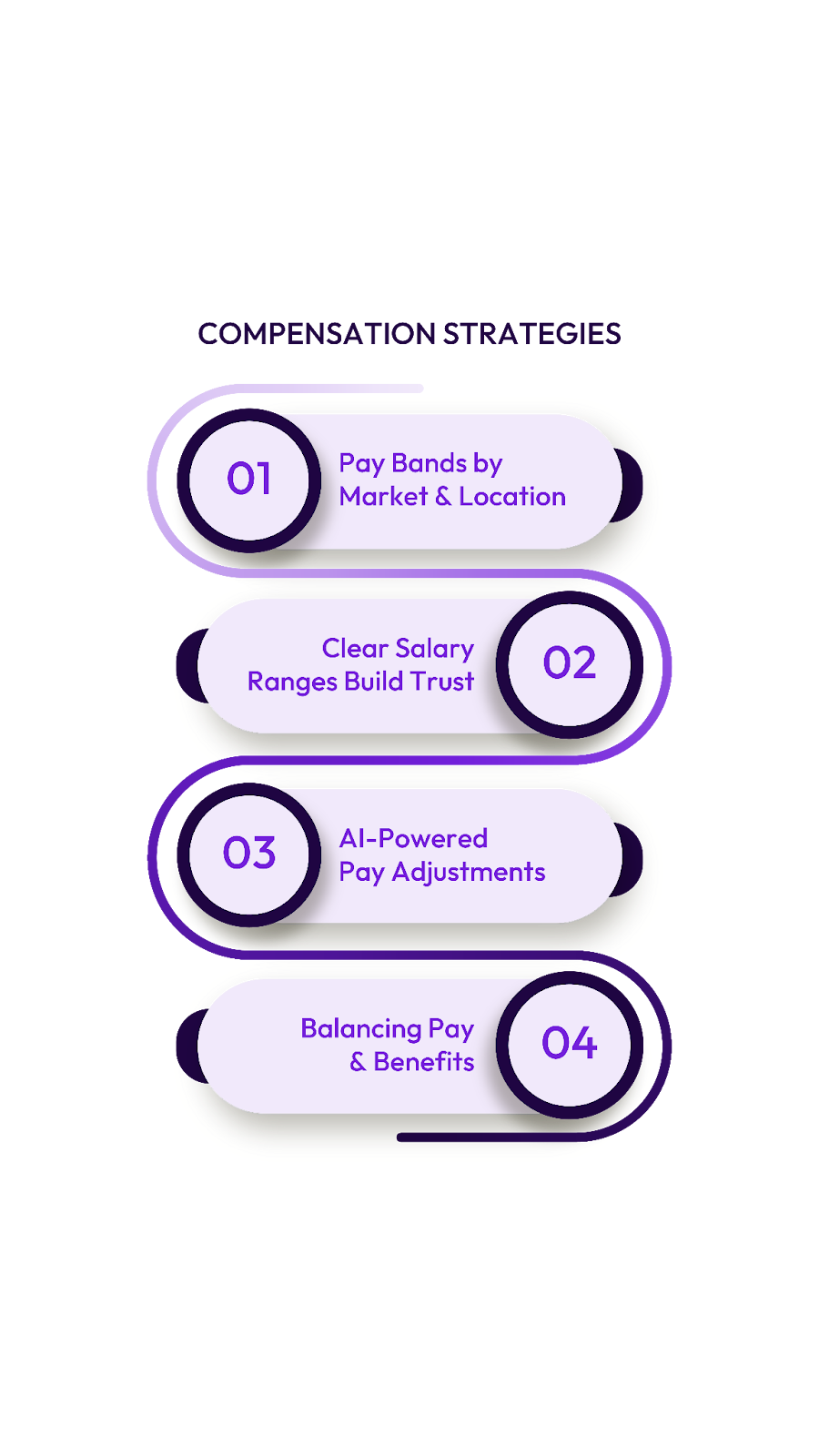
Building thoughtful compensation strategies is crucial to retaining top talent. These strategies go beyond simple paychecks and focus on structure, transparency, and data-driven adjustments.
1. Structured Pay Bands That Reflect Market and Geography
Creating clear and consistent pay bands helps ensure fair compensation across roles, levels, and locations.
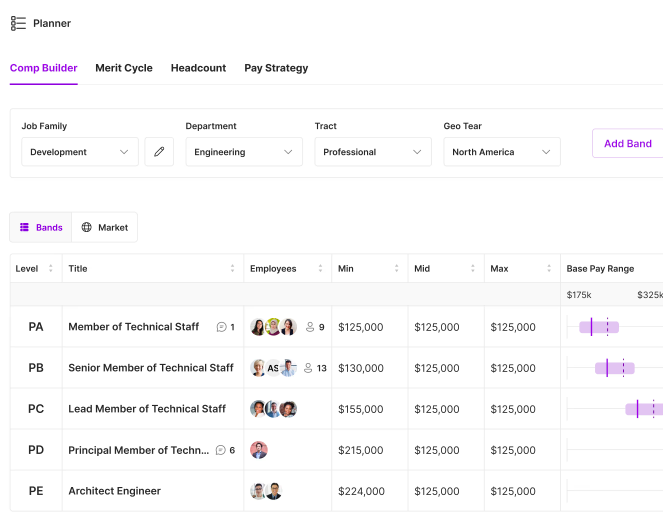
- CandorIQ’s Compensation & Payband Builder lets you define pay bands by level, department, and geography.
- It applies location-based salary adjustments using benchmark datasets, ensuring market competitiveness and equity.
- Version control and real-time pay distribution visualization enable efficient and transparent management of pay bands.
Transform your compensation strategy with the Compensation & Payband Builder!
2. Transparent Salary Ranges Build Trust
Sharing clear salary ranges with employees builds trust and reduces uncertainty around pay progression.
- Transparent pay bands help employees understand where they stand and how they can grow.
- Communication around compensation policies reduces confusion and aligns expectations across teams.
- This openness supports engagement and helps prevent pay-related dissatisfaction.
3. AI-Driven Insights for Proactive Compensation Adjustments
Using data and AI to analyze and forecast compensation needs empowers strategic decision-making.
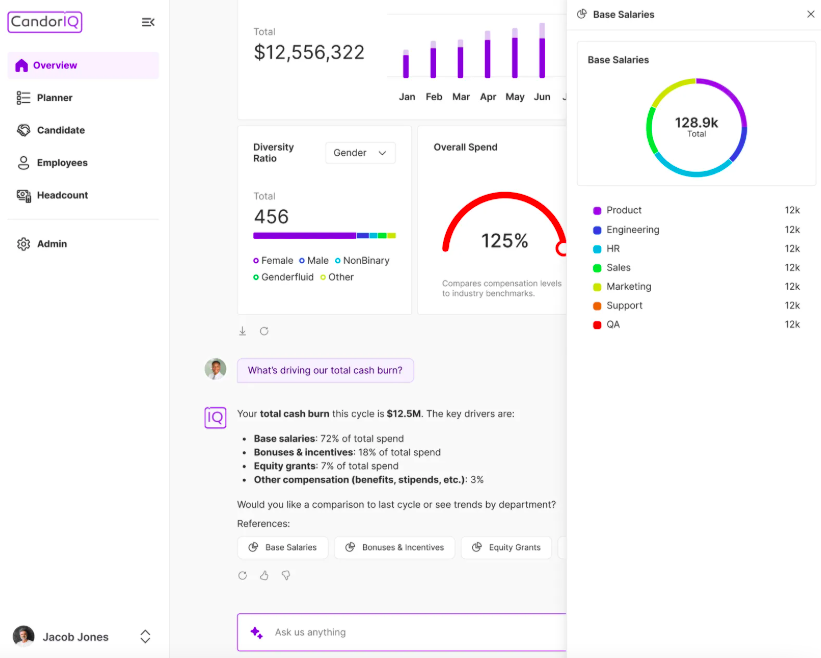
- CandorIQ’s AI Agent provides compensation recommendations based on historical benchmarks and peer data.
- It answers natural language questions to identify pay gaps, forecast workforce needs, and model compensation impact.
- This automation reduces manual work and helps HR leaders act quickly to keep pay competitive and fair.
Turn data into decisions with CandorIQ’s AI-powered agent!
4. Balancing Pay with Flexible Benefits
A competitive compensation package blends salary with benefits that meet employee needs.
- Flexible work options, wellness programs, and equity plans add value beyond salary.
- These perks contribute to employee satisfaction and retention, especially in remote or distributed teams.
- Combining tangible pay with meaningful benefits addresses diverse employee priorities and boosts loyalty.
Implementing these compensation strategies creates a solid foundation for retention and becomes even more powerful when tailored to meet the specific needs of different employee groups.
Tailoring Compensation Across Different Employee Segments
Retention challenges and motivators differ across employee groups. Recognizing these differences helps create compensation packages that truly resonate with your employees.
Understanding Varied Retention Drivers
Low-wage, mid-range, and high-wage employees often have distinct priorities regarding compensation and benefits.

Meeting Diverse Needs with Tailored Compensation
Adjusting compensation and benefits to different groups improves satisfaction and loyalty.

Tailoring compensation to meet diverse employee needs sets the stage for stronger retention and works best when fully integrated with workforce planning and budgeting.
Aligning Workforce Planning and Compensation for Better Retention
Successful retention depends on competitive pay and careful coordination between workforce plans and compensation budgets.
Integrating Headcount Planning with Compensation Budgets
Combining headcount and compensation planning ensures resources are allocated effectively and aligned with business goals.
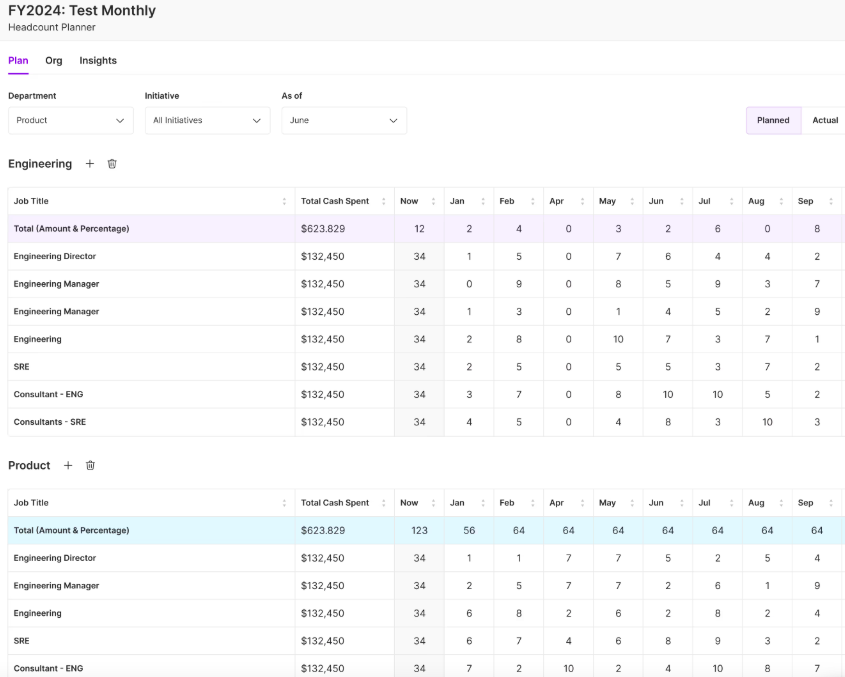
- CandorIQ’s Headcount Scenario Planning lets teams model future organizational structures and assess real-time financial impacts.
- Collaboration between HR and Finance becomes seamless, with scenario comparisons helping avoid costly misalignments.
- This integration supports more accurate budget forecasting and smarter workforce decisions.
Transform the way you manage team changes with CandorIQ’s Headcount Scenario Planning!
Avoiding Budget Surprises and Supporting Strategic Hiring
When headcount and compensation plans are aligned, companies can prevent unexpected budget shortfalls and hire strategically.
- Clear visibility into budget burn rates and compensation impact enables proactive adjustments.
- Strategic hiring decisions reflect actual business needs and financial constraints.
- This alignment reduces friction between HR, Finance, and leadership, supporting smoother talent acquisition and retention efforts.
Combining workforce planning with compensation management empowers companies to build sustainable, cost-effective retention strategies.
Conclusion
Compensation remains one of the strongest drivers of employee retention and workforce stability. Fair, transparent, well-structured pay and tailored benefits keep employees motivated and committed.
CandorIQ offers a unified platform for executing end-to-end compensation cycles, modeling real-time budget impact, automating workflows, and efficiently closing talent.
These solutions empower CFOs, People Ops, and Recruiting Managers to align compensation strategy with business goals while improving retention and operational efficiency.
Ready to simplify compensation, headcount planning, and retention? Book a Demo today!
Ready modernize your workforce and compensation strategy?
See how CandorIQ brings workforce planning and compensation together with AI.


